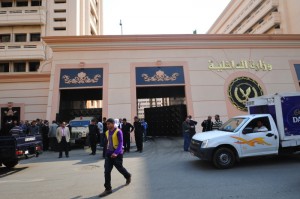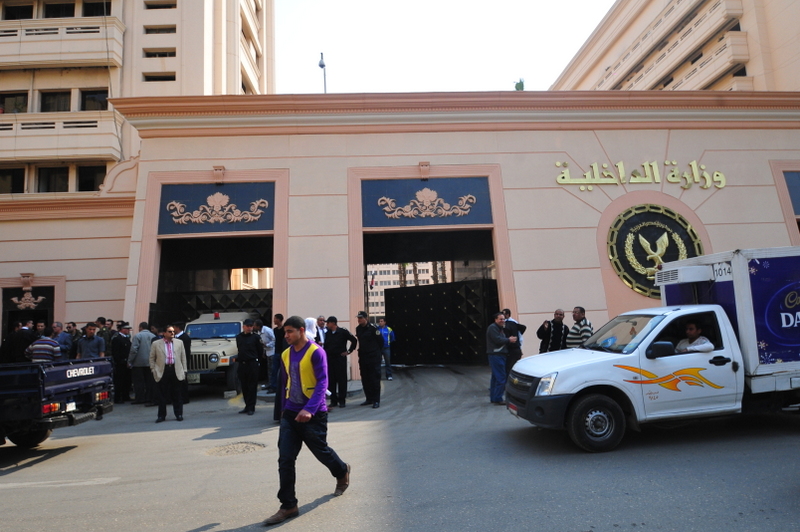
(DNE File Photo)
The Ministry of Interior has announced through its human rights’ department that citizens who claim they have been abused by police personnel should report them.
“[The ministry] rejects all forms of violations that might be committed by some policemen as individual actions that do not at all represent the ministry’s strategy. [The ministry’s] working system is based on justice and equality, protection of human dignity and non-interference personal freedoms and rights of all citizens,” the ministry said in a Sunday press release.
Mohamed Abdul Aziz, lawyer at the NGO Haqaneya Law Center, said he has never heard of a case where police staff were “punished” for violating a citizen’s right. Instead, he described the Ministry of Interior’s statements as a “bluff”.
This comes at the same time as new torture claims by prisoners of Abu Za’abal prison. Deputy Minister of Interior for the human rights’ sector Abou Bakr Abdul Kereem has repeatedly denied the claims to the media.
Abdul Kereem was unreachable by phone on Monday, but Daily News Egypt called the ministry under the pretext of reporting a police officer’s verbal abuse towards a citizen. The ministry specified three telephone numbers for citizens’ complaints. The numbers are mobile phones lines, which makes it easier to identify callers.
The human rights’ sector of the ministry responded fast. When asked about the procedures to follow for a complaint, the official said that the ‘claimant’ must have filed a police report immediately after the incident, informing the human rights’ department on the same day.
“In order for things to be able to take a correct legal path, the first step is to file a police report, then fax us a copy,” the official said. However, he failed to answer questions related to guarantees of protection for the witness.
A police report is the ordinary action in any case, where claimants and defendants’ names are fully provided.
“Citizens can always follow up with us over the phone or report any complications or further assault by the person they reported,” the official said.
He further failed to tell if there were any witness protection programmes. Despite the Ministry of Interior’s announcement of receiving citizens’ complaints regarding police officers’ attitude, that would make the body that committed the crime the same one investigating the crime. It comes with no guarantees whatsoever that the reported policeman would stay away from the ‘victim’.
The ministry’s attitude towards accusations against its personnel is denial. Abu Za’abal prison torture possibilities were not completely ruled out by state-affiliated National Council for Human Rights (NCHR) who visited the prison last week.
The report they issued confirmed a degradation in the conditions in which prisoners are living. NCHR member and doctor Salah Sallam had also confirmed that detained photojournalist Ahmed Gamal Ziada and others were beaten.
Abdul Kereem replied by stating that those were “birthmarks”, but Sallam mocked the logic of the statements and told Daily News Egypt that prison authorities ‘hid’ two of the prisoners the council demanded to meet during the visit.
In a previous example, former Minister of Interior Mohamed Ibrahim repeatedly denied any forms of physical violence by the police, especially in the incident involving the killing of socialist activist Shaimaa Al-Sabbagh.
Despite that, the efforts of the Forensic Medicine Authority and the Prosecution-General brought three police officers to trial in this case. They were accused of manslaughter and injury to citizens, in addition to hiding evidence.
Police violations towards citizens vary from verbal insults to physical assaults, to killing in some cases, such as that of Khaled Said in 2010, and the Abu Za’abal police vehicle killing of 37 detainees.
On a further note, El-Nadeem Center for the Management and Rehabilitation of Victims of Violence issued its March report regarding torture and maltreatment in Egyptian detention places. It traced the controversial deaths of civilians whilst in detentions due to severe beating and suffering, especially in Matariya police station.
The report also stated that some were kidnapped by unknown authorities and disappeared, others are sexually assaulted, and some go on hunger strikes damaging their health as a way to resist security forces’ claimed abuses.


